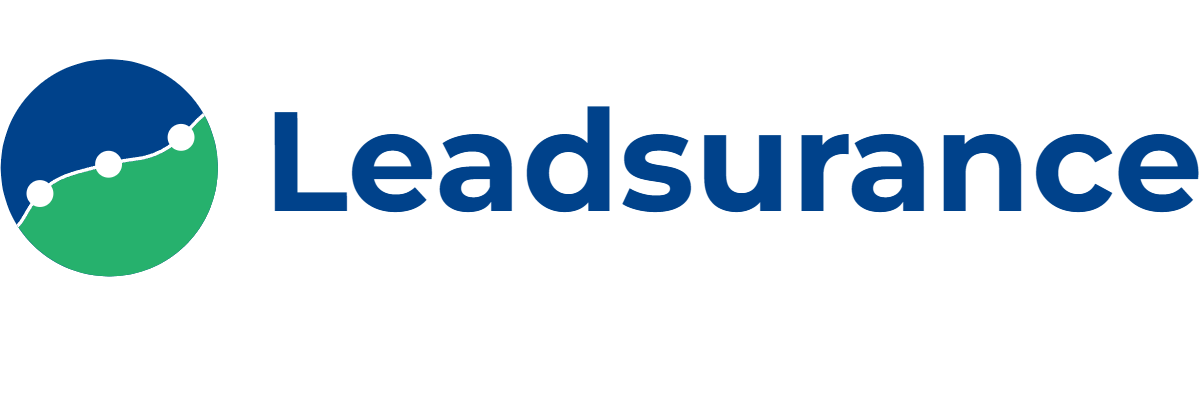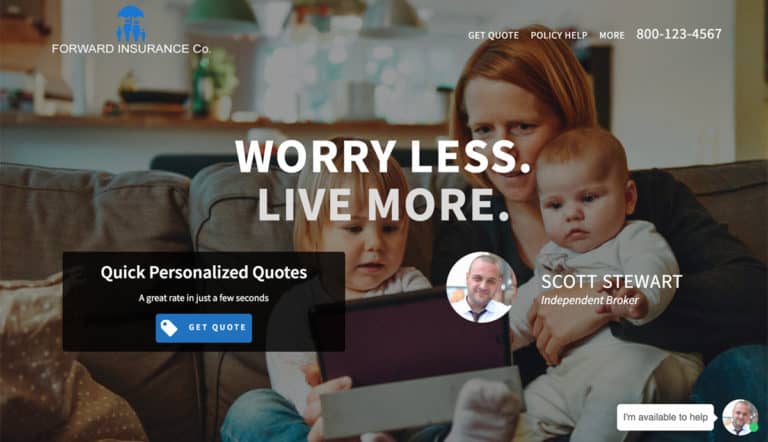As a digital marketer, my default response to, “how do insurance agents get clients?” usually involves blogging, SEO, social media, and improving your website.
Although these digital marketing activities are important for insurance agencies, they should never replace in-person interaction.
I know this first hand from my 11 years experience consulting clients ranging from local businesses to fortune 500 companies such as Keller Williams® and Bank of America®.
Client meetings have always been my consulting team’s time to shine. It is during these meetings that we have the opportunity to provide the most value and identify additional opportunities.
For insurance agents, client meetings are still just as important to have in 2019 than ever and can lead to opportunities to add value and cross-sell insurance policies.
Social Media certainly makes it easier to reach more people but it won’t replace a well-prepared meeting with your client.
To really connect, build trust, discover opportunities and provide value to your clients, try these helpful tips for improving your client meetings.
Let’s dive in!
1 Know Your Client
You should always do some research before meeting with both prospective and current insurance clients.
Here are a couple pieces of info that can help when going into your first client meeting with a referral.
Researching Referral Clients
- Who referred the client
- Their specific insurance needs
- Something interesting you may have in common or could discuss (a hobby or sports team for example)
You definitely want to be able to talk insurance with this new prospective client and help deliver the products they need.
But, just as important, you want to build rapport and trust and show them that you are a friend and an advisor.
You need to stand out from the other thousands of agents that all consumers have the ability to access within seconds.
If your client meeting doesn’t go well, the client knows that the can simply get on Google and find another agent in seconds.
Make them feel special with how much you know about them going into the meeting to really build trust.
Now, like I mentioned above, you should also do some research to prepare for meetings with existing clients.
You are looking for cross-selling opportunities such as these.
Researching Current Clients
- Life insurance clients without health insurance
- Group health insurance clients without add-ons such as vision or dental
- Life insurance clients without annuities or short-term disability coverage
Filter through your customer database to find opportunities for adding value to your clients through cross-selling insurance products that will help them.
Try reviewing groups of similar customer profiles to get ideas for the types of insurance products your other similar customers may need.
2 Calendar Appointment Reminders
If you use Google Calendar, or Outlook, or some other calendar application – make sure you set appointment reminders for you AND your client.
- Time of meeting
- Place of meeting
- Duration of meeting
- Items to bring to meeting
Make sure they know which paperwork and personal information they may need before the meeting starts.
This will save you time during the meeting and make you more productive.
I know it might sound strange that I’m listing something as simple as calendar appointments. But sometimes very small details such as calendar reminders can ruin a meeting by preventing it from happening in the first place.
Or completely save the meeting by making sure you get in front of the client in a timely manner.
Pro Tip
If you are using Gmail then be sure to check out this article on the best Gmail extensions out there. I use Yanado, an extension + iPhone/Android app to help you stay organized and on task. It is worth it’s low cost. It enables the user to create tasks and reminders, similar to appointment setting, but for your tasks not meetings. Everything is in a nice checklist with reminders for you to check off as you go. I also recommend using a chatbot to schedule meetings.
3 Listen, Listen, Talk, Listen
You definitely need to talk and provide advice as an insurance advisor.
However, during your client meeting it is best to ask questions and take notes.
You need to know if the client is shopping for multiple types of insurance, had a recent major life change, and what their goals are.
Try to listen and take notes while providing valuable thoughts when they ask for your opinion and occasionally interjecting with useful comments.
4 Focus on the Client
Might seem like a no-brainer.
But you’d be surprised.
Unless you have an extremely urgent call you are expecting, AND you tell the client up front, then your phone should be hidden and on silent during your meetings.
You shouldn’t be paying attention to anything other than your client during these meetings.
Even if there is some obnoxious construction noise outside, you just keep smiling and focusing on your client.
Do not continually check your watch or a clock, never check your phone, and only pull out a computer if you both agree to look something up.
5 Prepare Meeting Materials
Showing up with all of your research, paperwork, and information ready to go will make a huge difference in your success.
One of the best ways to build trust with a new client is to show them that you are on top of things.
That they can expect you to be prepared ahead of time and get things done in a timely manner.
Try showing up to your meetings a few minutes early as well.
If you plan to meet in public places like restaurants make sure you can find low traffic quiet venues where discussing business is comfortable and well suited.
Like a low key coffee shop without music or a quite cafe diner.
6 Engage the Conversation
Breaking the ice and getting things started with your new insurance client is up to you.
Whether they are the person you would chat it up with during your free time or not, you need to chat them up a bit now.
Upon first greeting and meeting them make sure you have some engaging comments to make.
This goes back to the first tip on doing your research. Knowing some things about them to talk about right away will really help break the ice and engage them in a conversation with you.
From here, talking insurance will be much easier.
7 Open the Insurance Discussion
After a couple of minutes of chit-chat, it is time to discuss insurance.
This is the reason you both came to the meeting, so do not put it off too long.
It is good to go into this discussion by mentioning what you already have researched about the client’s insurance needs while asking them to clarify or add any additional comments.
This shows that you are prepared and did your research but that you are there to listen, learn, and provide a valuable solution unique to that client’s needs.
Something like this is a great opener to your insurance discussion,
“Ok Kim, so John told me that he was referring you over to get help with selecting a Term Life policy. That’s a great policy to consider and I can help you understand all of the intricacies, but first is there anything else or anything specific you’d like to ask?”
8 Wrap Things Up
It is important to close the meeting as smoothly as you opened it.
You need to make sure that everything that needed to be discussed and covered was talked about.
You want to ensure that the client doesn’t leave the meeting feeling as if there was more information they needed.
So, simply say,
“Before we wrap things up, let’s make sure we covered everything today. We talked about your circumstances and why a term life insurance will be the best option for you. I got all of your personal and health information so that I can run your quotes and help you apply. I am going to send you an email with all of my contact info and our next steps. Was there anything else we need to discuss before we leave today?”
Going back over what you already discussed will help everyone mentally check off their lists and feel certain that the meeting was productive and covered everything.
And if anything was missed, now it will get covered before you leave.
9 Respect the Client’s Schedule
If something in your schedule changes last minute, do your best to keep your commitment to your client.
You really need to show that you respect their schedule and time.
Additionally, try not to keep the client there too long after you wrap things up.
This is important to respect their time. Even if they are retired.
Additionally, it is important they see that you are busy as well so that they do not infringe on your time.
After all, you do have other clients to tend too.
It is a fine line to balance, make sure you are present and engaging without seeming rude and rushed.
But also make sure to be to the point and clearly communicate your schedule and that you don’t want to waste any of their time.
In business relationships people prefer to keep things to the point and efficient.
10 Follow up Accordingly
This one should go without saying.
Whether you met with a prospective client or current client, you should always follow up.
Your follow up is essential to show the client that you were attentive and care about them.
Send them a short email that includes a list of the points you all discussed and a plan for taking action.
This lets them know that you are ready to work with them and continue the process.
Make sure the email includes your next steps.
When following up with existing clients who you have a strong relationship with, don’t forget to also ask for feedback, online reviews, and/or referral business.
Pro Tip
If you want to take your email game to the next level, you can checkout another extension I recommend called Docsify. It provides tracking on all of your emails from Gmail along with statistics to see how people interact with your emails. The insights can be helpful plus it also offers email templates which can save you a lot of time.
Conclusion
Alright agents, there you go, 10 ways to improve your client meetings.
If before you were asking, “How do insurance agents get clients?”
Then now you know, they get them during a well planned professional meeting.
Now go crush your next client meeting!
At Leadsurance, we know how busy insurance agents are with managing clients at many different stages of the buying process.
Our automated insurance marketing platform helps save agents time staying in contact with their audience and past clients.
This keeps agents top of mind with their clients and prospects while freeing up their time to focus on other aspects of their business.
You can get a live 1 on 1 demo of our platform today to see how Leadsurance can help your insurance agency.
Drop a comment below if you have any questions.






